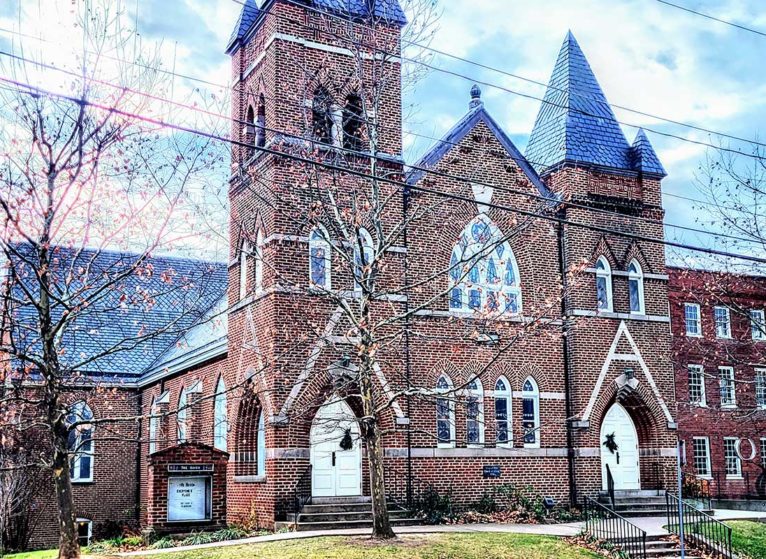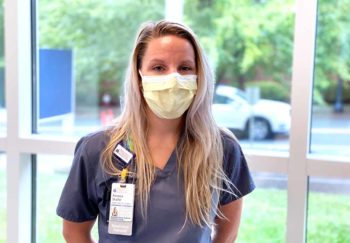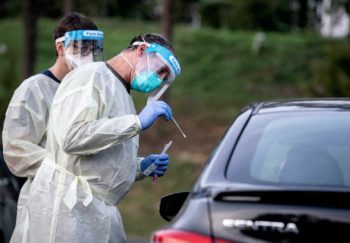2021 was another hard year. But our team of employees, students, and volunteers rose to the occasion, doing whatever it took to help our patients and our community. Here’s one of our favorite stories that helped us make it through 2021, about volunteers providing healthcare to the homeless.
Imagine having a fever, a sore throat. You can't stop coughing. You're weak and achy. But instead of having the option to curl up in your warm bed, you're bundled in a sleeping bag on cold brick. Instead of an appointment with your primary care doctor, you've no idea where to go for a test, let alone treatment. You're not just sick; you're terrified.
The global pandemic hit all of us where we were most vulnerable. For those who are homeless, just being ill by itself poses obstacles. Sleeping in a car, on a shelter cot, outside on a park bench — these situations expose and harm more than heal. Lacking the ability to safely quarantine, practice social distancing, or access healthcare, people without housing have faced, in COVID, insurmountable challenges.
Or, they would be insurmountable, but for the efforts of gastroenterologist Ross Buerlein, MD, and the volunteers at the UVA Health Community Outreach Clinic. They've been working since the onset of the coronavirus outbreak to help the unhoused survive.
Why Patient Trust is Critical
They'd already been hosting a weekly clinic at the Haven. Buerlein saw the need clearly.
"In providing healthcare to the local homeless population, our healthcare system spends tons and tons of money. Worse — these patients have high rates of readmission and very few good outcomes,” Buerlein says. It was a lose-lose situation that Buerlein wanted to change into a win-win.
The model had to shift. Healthcare had to go where the people needed it, not the reverse. The ability to make an appointment and get care requires more privilege than most people might think.
Although we live in one of the richest countries in the world, Buerlein points out that not everyone in our society enjoys those riches. "We have very disparate healthcare here in the U.S.," he says. "The folks on the downtown mall might as well be in Malawi, and they're just a mile from UVA hospital. The sheer number of barriers to someone getting to an appointment is enormous."
Earning Trust Took Time & Proved Key
Buerlein describes how tough it was in the beginning.
"We showed up at the Haven and just sat there," he says. "When you've had bad experiences in a healthcare setting, when you've been stigmatized, you develop an inherent level of mistrust for the medical system, much more deep-seeded than I realized. I underestimated it."
It took time to establish credibility with the community. Buerlein says they started by "interacting socially, not from a medical standpoint. We helped them with things they needed assistance with, and then started to see a few individuals in the clinic. They in turn let their friends know we were OK. It was a very slow build, but over time, those relationships formed."
Healthcare for the Homeless: Caring for the Whole Person
Volunteers were regularly providing routine as well as specialty care. They mainly aided people with:
- High blood pressure
- Diabetes management
- Orthopedic injuries
- Infections
- Substance abuse
- Getting back into the healthcare system
- Going through a financial screening, getting aid, to access everything UVA can provide
But caring for the health of a person without a home required more than just offering medical treatment. An undergraduate on Buerlein's team, Ashwin Mahesh, developed a street sheet of community organizations. Housing this list of area agencies in one place has made it easier for people to find resources they need to address the other stresses of their lives, all of which compromise well-being in some way.
Buerlein tells the story of a family that came to Charlottesville newly homeless. "They didn't know the system, the city, literally had nothing. We found them a roof, got them qualified for healthcare, set up appointments, job interviews, the meds they needed — all within less than an hour."
Then Came COVID
"We were hitting a beautiful stride," Buerlein remembers. "Then COVID hit, and it was like we had to start from scratch."
Buerlein watched as the pandemic began its damage. For people without housing, COVID posed unique issues. Following precautionary measures in close quarters or no quarters at all makes it hard to:
- Find food, safe drinking water, bathrooms
- Maintain social distancing
- Stay healthy
- Find masks
- Wash hands
"And what do you do with a positive case? With no home to stay in for isolation?" Ultimately, Buerlein worked with city leaders to get hotels to accommodate positive cases.
And the health team pushed through. When in-person clinics couldn't happen, they began virtual visits. "We were there regularly; we didn't stop," Buerlein says.
The efforts of the outreach team to stay connected to their patients during the height of the pandemic resulted in positive benefits no one had predicted.
Support the Clinic
Learn more about the impact of the community clinic and how you can give.
"Things are easier now," Buerlein reflects. "All of those telemedicine visits, that internet interaction, created a whole new level of trust. Now we're back to in-person visits, and we have expanded to another location," a nearby hotel providing housing to the homeless.
Another recent innovation: the Inpatient Homeless Consult Service. Initiated by resident Jacquelyn Carson, the program seeks to help people experiencing homelessness get transportation to appointments, find a place to heal, and apply for Medicare. This kind of planning improves the ability of the patient to heal and keeps them from returning to the hospital.
Healthcare for the homeless might seem like something remote. Yet, this is the kind of proactive healthcare and kindness that betters all of us.


